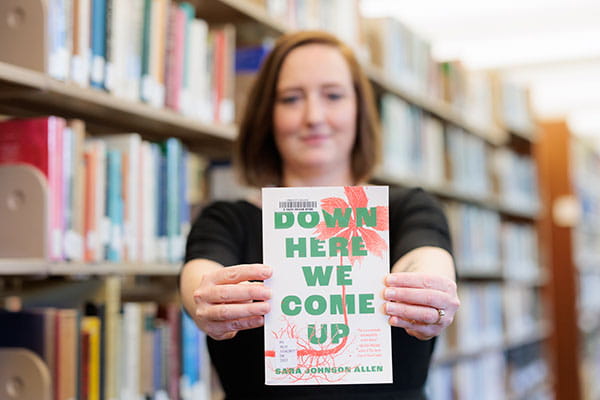For the last 15 years, when she could have been sleeping, practicing self-care, running marathons, or deep-cleaning her kitchen, Sara Johnson Allen was instead working on her first novel, Down Here We Come Up.
“It was a difficult process. I easily went through 100 drafts. Even after my agent sent it out, the book was turned down by at least 30 editors. I cut and rewrote hundreds of pages and submitted it again,” said Allen from her writing desk. “I want to be honest about life, especially with my students. My path was winding. It took me longer to get here than I expected.”
Eventually, Black Lawrence Press accepted the manuscript, which was awarded the prestigious 2022 Big Moose Prize.

Allen always loved writing but didn’t focus on it in school because penning stories didn’t seem like it would pay enough to tackle student debt or guarantee health insurance. “Right out of college, I sold travel packages to high school teachers, worked as an assistant, and eventually ended up in non-profit marketing,” Allen recalled.
It was a creative field that required strong writing skills, but Allen couldn’t get literature out of her system.
Early in her career, while working as an assistant at Emerson College, she audited a fiction writing class. “It was a lightning bolt moment for me. I knew that this was what I was supposed to be doing,” she said. Pulling unforgiving hours, Allen put herself through an MFA in creative writing while working as a marketing writer at Dana-Farber Cancer Institute.
Since 2009, she’s taught marketing and communications skills to Endicott students with just as much passion as she’s put into writing her first book. Most of her students have no idea their professor sweats it out on the page, losing herself in damaged, irreverent characters. “I like troublemakers,” said Allen of the bias that is also reflected in the cinematic, gruff television series she binges like Ozark and Breaking Bad.
Set in rural North Carolina, Down Here We Come Up follows three women who have lost connection with their children for various, complicated reasons.
Teen mother Kate Jessup escaped poverty and her own neglectful mother, Jackie, for a more steady life amongst a privileged Boston Brahmin family. She’s forced to return to North Carolina when Jackie becomes gravely ill—but her home and mother are both nearly unrecognizable—and Jackie is wrapped up in a complex web of illegal immigration, cross-border human trafficking, the drug trade, and redemption.
“A person cannot stand in two places at once. Use that to your advantage,” Jackie tells her daughter. But which life will Kate ultimately choose?
Allen, who grew up in Raleigh, said that although her lived experience doesn’t echo Kate’s, her family first came to the Eastern part of the state 300 years ago as poor farmers, and she has deep, complicated roots in North Carolina.
At one point, Kate is paid by a farmer to kill sick turkeys—a scene that came straight from Allen’s own adolescence helping out in her uncle’s turkey houses. It’s a lesson in surviving a brutal world—and one that the third protagonist, Maribel Reyes, a teacher from Ciudad Juárez, Mexico, also learns as she desperately seeks a way to smuggle her three young children across the border to join her in the U.S.
Allen said she didn’t know how the story would play out at any point—literally questioning and rewriting right up until the novel was published. “It’s the same process that we follow in my campaign planning and creative portfolio-building courses,” she explained. “We’re doing all the strategic thinking around the content and asking ourselves how we can make it better.”
One thing Allen wrestled with was whether she, a white American woman, had the lived perspective required to write about immigration and oppression she hadn’t personally experienced and when she herself had never lived in Ciudad Juárez.
At Allen’s suggestion, Black Lawrence Press hired a professional sensitivity reader, Alejandra Oliva, whose memoir Rivermouth is a tale of family and working as a translator for people seeking asylum at the border.
“As a writer, it’s my obligation to seek perspectives that can honestly tell me what I’ve gotten wrong,” Allen said. “It’s unbelievable how just one check in the box under ‘citizenship’ in the United States spares you from an entire category of things that happen to you when you don't have the privilege of citizenship.”
Allen relentlessly pushed forward even after the first round of submissions to publishers hit a wall of rejection. Sandwiched between the first and last pages, she raised three children along the way.
“The entire time my kids have been alive, I’ve balanced this calling to be a teacher and to write with being a mother. I love my children, and I’d die for them. All the things these mothers do in my book, I would do to protect my children. But balancing the demands of work and family life with being an artist is challenging. For most people I know, trying to do all three often feels impossible.”
Impossible or not, Allen has made it all work while finishing her second novel and is now starting a third book-length work of creative nonfiction—all while juggling teaching, giving interviews with the likes of NPR, and extending her summer book tour into fall and winter.
“My two-week book tour from Wilmington to Nashville was incredible,” she said. “So, so great to be in that many vibrant independent bookstores and see so many friends and family.”
This fall, you can find her in New York, Maine, San Francisco, and right here at Endicott, of course.
Sara Johnson Allen will discuss Down Here We Come Up on October 6 at noon in the Klebanoff Auditorium.


